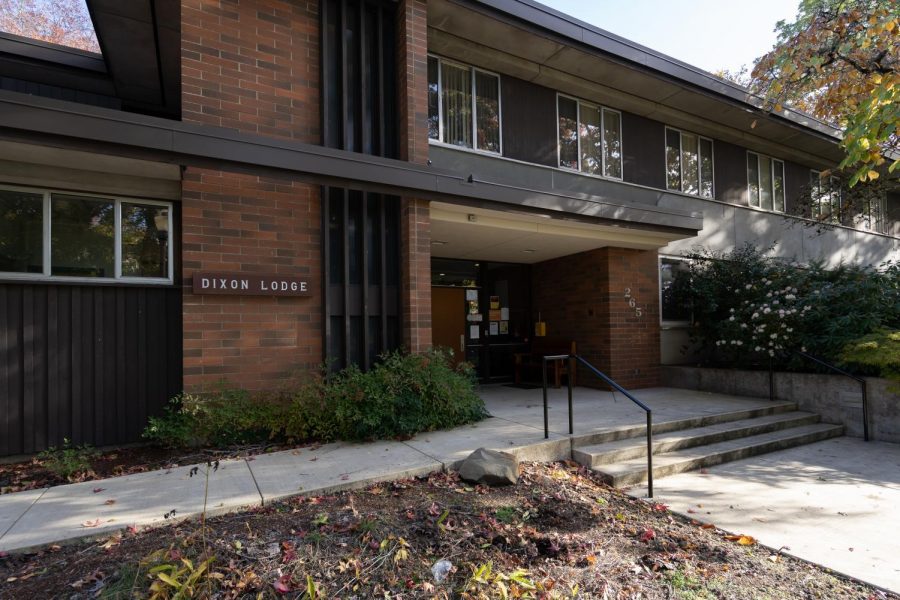OSU students with history of addiction find solidarity, support in Collegiate Recovery Community
January 6, 2020
Correction: This article had previously left out the full name of the Joan and Tom Skoro Collegiate Recovery Community. The term ‘substance abuse’ was also used in this article, which has now been updated to ‘substance use disorder’ or ‘substance use.’ Additionally, Jamie King’s affiliation with the CRC was incorrect. These issues have been resolved.
Editor’s Note: The following article discusses substance addiction. The article uses an anonymous source. Names with an asterisk are pseudonyms.
The Joan and Tom Skoro Collegiate Recovery Community, based out of Dixon Lodge, opens its doors to students seeking a sober lifestyle during their collegiate career.
According to Oregon State University Student Health Services, the significant life changes and stress associated with transitioning to college threaten many students in the substance use disorder recovery process. After its launch in 2013, the community continues to expand and provide helpful resources and sober lodging to its members.
Taylor Milam, the collegiate recovery coordinator, said societal stigmas regarding addiction and those who suffer from it can trickle down to the on-campus culture surrounding addiction. Those without an understanding or history of addiction may place negative stigmas upon those in recovery or still struggling with addiction, causing those afflicted students to possibly internalize and believe these negative stigmas.
Additionally, Milam said the prevalence of substance use in student parties or other social get-togethers creates a difficult decision for students in recovery. Attending these get-togethers could put their recovery in peril, while not attending could hinder their ability to socialize.
“The primary consequence for the person struggling with addiction is shame and isolation,” Milam said.
Milam said the CRC aims to change the mindset of substance use on campus by normalizing refraining from drugs and alcohol. To accomplish this, the CRC provides many resources to community members, including drug and alcohol free spaces, support groups, optional counseling, academic advising and a tight-knit fellowship of other individuals facing similar challenges.
Jamie King, a third-year human development and family science student and member of the Joan and Tom Skoro Collegiate Recovery Community, has a history of driving under the influence, misdemeanors and mental illness. For these reasons, King said she knew she would need additional support during her college career to live a happy and progressive life.
According to King, hearing students on campus discussing and even bragging about substance use left her feeling uncomfortable and misplaced. King said she can’t expect these students to be aware of her history, but nonetheless is still affected by these conversations.
“I do feel invisible, and hurt,” King said.
King turned to the OSU website to seek an on-campus culture that could accommodate her. There, she found CRC. She was particularly interested in the Clubhouse, an alcohol and drug-free place for sober students to hang out. At one month sober, King applied and was accepted into CRC.
Now, at four months sober, King said she feels confident in her progress with the CRC backing her up. Although the benefits of CRC are vast, King said she’s particularly grateful to have participated in CRC meetings that allowed her to further understand concepts such as equanimity.
“I feel safe, accepted and grateful,” King said.
Another member of the CRC community and fourth-year public health student, Riley*, grew up surrounded by substance use disorder. Right before returning to OSU for the school year, Riley* found themself relapsing into a heroin and meth addiction. Riley* decided to delay their return to school to attend rehab. Upon deciding to return to classes, they worried over the possible challenges they may face.
“I thought there was no way I was going to make it in college without relapsing and without any support,” Riley* said.
Before returning to OSU, Riley* said they discovered the CRC and found a group they could relate to, seek comfort from and live in solidarity with. Riley* said the recovery group meetings hosted at Dixon Lodge were more beneficial than others since they were geared toward college students specifically.
According to Riley*, CRC at Dixon Lodge is the only recovery program in the state that offers housing along with membership. The CRC Clubhouse also places emphasis on being a community open to members of the LGBTQIA+ community and people of color, two groups disproportionately affected by addiction, Riley* said.
Riley* said the 24-hour access to a safe space with many accommodations and constant community support was pivotal in their experience. Even after relapsing into addiction, they were met with compassion, support and resources.
“I don’t know how I would stay alive if not for their support,” Riley* said.











































































































